

Learning Beyond Letter Grades. Assistant Vice President of Academics and Associate Professor of Educational Design & Technology Dr.
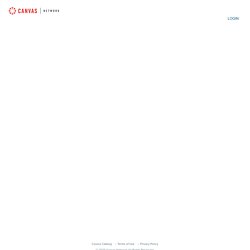
Bernard Bull currently serves as Assistant Vice President of Academics, Associate Professor of Education, and Director/Chair of the M.S. in Educational Design & Technology at Concordia University Wisconsin (CUW). He completed his undergraduate studies at CUW with a B.A. in education, history, and theology. He also has an M.A. in curriculum and instruction (Concordia University Chicago), a Master of Liberal Studies (University of Wisconsin-Milwaukee), and an Ed.D. in instructional technology (Northern Illinois University) where he focused on the social and ethical implications of technology in education. His creative, research, and scholarship interests largely focus on the intersection of digital culture, innovation, and education. R1_benchmark_polbrief_Herman.indd - r1_benchmark_polbrief_herman.pdf. Educational Leadership:Using Data to Improve Student Achievement:How Classroom Assessments Improve Learning. Educational Leadership:Using Data to Improve Student Achievement:How Classroom Assessments Improve Learning.
Bernard Bull. Grading vs. Assessment of Learning Outcomes. There is often confusion over the difference between grades and learning assessment, with some believing that they are totally unrelated and others thinking they are one and the same.
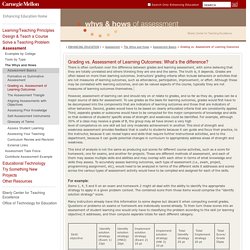
Complete List of Web Accessibility Evaluation Tools. Udai Waterloo OMR tool. This is a free-to-use OMR (Optimal Mark Recognition) tool, meant for non-proft social development organizations to conduct surveys and digitize data recorded on paper forms.
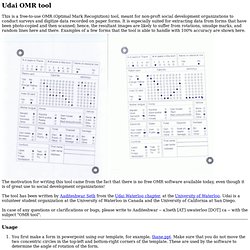
It is especially suited for extracting data from forms that have been photo-copied and then scanned; hence, the resultant images are likely to suffer from rotations, smudge marks, and random lines here and there. Examples of a few forms that the tool is able to handle with 100% accuracy are shown here. The motivation for writing this tool came from the fact that there is no free OMR software available today, even though it is of great use to social development organizations! The tool has been written by Aaditeshwar Seth from the Udai Waterloo chapter, at the University of Waterloo. Udai is a volunteer student organization at the University of Waterloo in Canada and the University of California at San Diego.
Usage. Study finds students don't learn more from charismatic lecturers. Imagine you receive the same lecture twice: once from a charismatic lecturer speaking fluently without notes and maintaining eye contact; and again from a hesitant speaker, slumped over her notes and stumbling over her words.
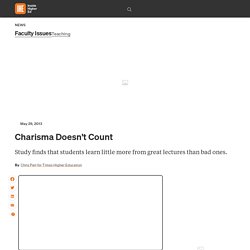
Which is better? In terms of what you learn there is surprisingly little to choose between the two, according to a team of psychologists. The researchers asked two groups of students to sit through the same lecture delivered in radically different styles. When asked afterward how much they felt they had learned, those who had experienced the more accomplished performance believed they had learned more than the second group. However, when tested, there was little difference found between them, with those attending the "better" lecture barely outperforming their poorly taught peers. "The hard work has to be done by the learner -- there's not much the instructor can do to make the neuroconnections necessary for learning.
" Competency-based education's newest form creates promise and questions. Earlier this year Capella University and the new College for America began enrolling hundreds of students in academic programs without courses, teaching professors, grades, deadlines or credit hour requirements, but with a path to genuine college credit.
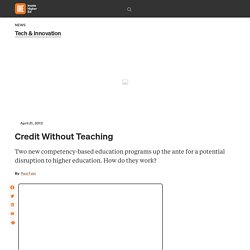
The two institutions are among a growing number that are giving competency-based education a try, including 25 or so nonprofit institutions. Notable examples include Western Governors University and the Kentucky Community and Technical College System. These programs are typically online, and allow students to progress at their own pace without formal course material. They can earn credit by successfully completing assessments that prove their mastery in predetermined competencies or tasks -- maybe writing in a business setting or using a spreadsheet to perform calculations.
College for America and a small pilot program at Capella go a step further than the others, however, by severing any link to the credit hour standard. Measuring Success: Evaluation Strategies for Distance Education - eqm0213.pdf. Align Assessments, Objectives, Instructional Strategies - Teaching Excellence & Educational Innovation.
Assessments should reveal how well students have learned what we want them to learn while instruction ensures that they learn it.
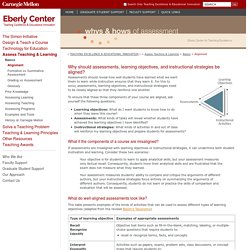
For this to occur, assessments, learning objectives, and instructional strategies need to be closely aligned so that they reinforce one another. To ensure that these three components of your course are aligned, ask yourself the following questions: Students Should Be Tested More, Not Less - Jessica Lahey. When done right, frequent testing helps people remember information longer.
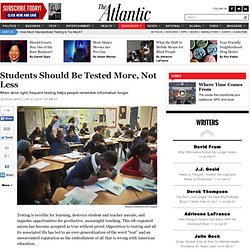
Testing is terrible for learning, destroys student and teacher morale, and impedes opportunities for productive, meaningful teaching. This oft-repeated axiom has become accepted as true without proof. Opposition to testing and all its associated ills has led to an over-generalization of the word “test” and an unwarranted reputation as the embodiment of all that is wrong with American education. One researcher believes we are throwing a very effective learning tool out with our educational bathwater, and asserts that we should be testing students more, not less.
Henry L. Researchers have long known about the “testing effect,” the phenomenon of improved performance through testing.